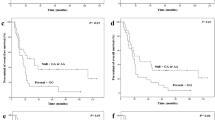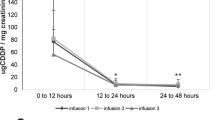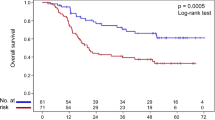Abstract
Platinum agents cause DNA cross-linking. Nucleotide excision repair genes play a key role in DNA damage repair. This study aims to investigate whether polymorphisms in these genes are associated with tumor response and survival in cisplatin-treated osteosarcoma patients. Eight single nucleotide polymorphisms in ERCC2, XPC, XPA, ERCC1, ERCC4 and ERCC5 genes were analyzed in 91 patients diagnosed with osteosarcoma and treated with cisplatin. A significant association with tumor response, after correction for multiple testing, was found for the Lys751Gln polymorphism in the ERCC2 gene. We found that only 45% of patients with at least one polymorphic G allele responded compared with 80% of patients homozygous for the common T allele (odds ratio=4.9, 95% confidence interval=1.64–14.54, adjusted P-value=0.047). In addition, carrying at least one ERCC2 Lys751GlnG allele was significantly associated with shorter event-free survival (median=184 months, compared with 240 months for TT homozygotes; hazard ratio=5.76, 95% confidence interval=1.30–25.55; P-value=0.021). Although ototoxicity was only recorded in 32 patients, we found weak evidence of an association with the CC genotype of XPC Lys939Gln (P-value= 0.042). This is the first pharmacogenetic study focused on osteosarcoma treatment providing evidence that polymorphic variants in DNA repair genes could be useful predictors of response to cisplatin chemotherapy in osteosarcoma patients.
This is a preview of subscription content, access via your institution
Access options
Subscribe to this journal
Receive 6 print issues and online access
$259.00 per year
only $43.17 per issue
Buy this article
- Purchase on Springer Link
- Instant access to full article PDF
Prices may be subject to local taxes which are calculated during checkout

Similar content being viewed by others
References
Marina N, Gebhardt M, Teot L, Gorlick R . Biology and therapeutic advances for pediatric osteosarcoma. Oncologist 2004; 9: 422–441.
Longhi A, Errani C, De Paolis M, Mercuri M, Bacci G . Primary bone osteosarcoma in the pediatric age: state of the art. Cancer Treat Rev 2006; 32: 423–436.
Glasser DB, Lane JM, Huvos AG, Marcove RC, Rosen G . Survival, prognosis, and therapeutic response in osteogenic sarcoma. The Memorial Hospital experience. Cancer 1992; 69: 698–708.
Bielack SS, Kempf-Bielack B, Delling G, Exner GU, Flege S, Helmke K et al. Prognostic factors in high-grade osteosarcoma of the extremities or trunk: an analysis of 1702 patients treated on neoadjuvant cooperative osteosarcoma study group protocols. J Clin Oncol 2002; 20: 776–790.
Chou AJ, Gorlick R . Chemotherapy resistance in osteosarcoma: current challenges and future directions. Expert Rev Anticancer Ther 2006; 6: 1075–1085.
Rabik CA, Dolan ME . Molecular mechanisms of resistance and toxicity associated with platinating agents. Cancer Treat Rev 2007; 33: 9–23.
Zamble DB, Mu D, Reardon JT, Sancar A, Lippard SJ . Repair of cisplatin—DNA adducts by the mammalian excision nuclease. Biochemistry 1996; 35: 10004–10013.
Dabholkar M, Thornton K, Vionnet J, Bostick-Bruton F, Yu JJ, Reed E . Increased mRNA levels of xeroderma pigmentosum complementation group B (XPB) and Cockayne's syndrome complementation group B (CSB) without increased mRNA levels of multidrug-resistance gene (MDR1) or metallothionein-II (MT-II) in platinum-resistant human ovarian cancer tissues. Biochem Pharmacol 2000; 60: 1611–1619.
Quintela-Fandino M, Hitt R, Medina PP, Gamarra S, Manso L, Cortes-Funes H et al. DNA-repair gene polymorphisms predict favorable clinical outcome among patients with advanced squamous cell carcinoma of the head and neck treated with cisplatin-based induction chemotherapy. J Clin Oncol 2006; 24: 4333–4339.
Park DJ, Stoehlmacher J, Zhang W, Tsao-Wei DD, Groshen S, Lenz HJ et al. A Xeroderma pigmentosum group D gene polymorphism predicts clinical outcome to platinum-based chemotherapy in patients with advanced colorectal cancer. Cancer Res 2001; 61: 8654–8658.
Gurubhagavatula S, Liu G, Park S, Zhou W, Su L, Wain JC et al. XPD and XRCC1 genetic polymorphisms are prognostic factors in advanced non-small-cell lung cancer patients treated with platinum chemotherapy. J Clin Oncol 2004; 22: 2594–2601.
Ruzzo A, Graziano F, Loupakis F, Santini D, Catalano V, Bisonni R et al. Pharmacogenetic profiling in patients with advanced colorectal cancer treated with first-line FOLFIRI chemotherapy. Pharmacogenomics J 2008; 8 (4): 278–288.
Clark JC, Dass CR, Choong PF . A review of clinical molecular prognostic factors in osteosarcoma. J Cancer Res Clin Oncol 2007.
Clark JC, Dass CR, Choong PF . A review of clinical and molecular prognostic factors in osteosarcoma. J Cancer Res Clin Oncol 2008; 134: 281–297.
Stoehlmacher J, Park DJ, Zhang W, Yang D, Groshen S, Zahedy S et al. A multivariate analysis of genomic polymorphisms: prediction of clinical outcome to 5-FU/oxaliplatin combination chemotherapy in refractory colorectal cancer. Br J Cancer 2004; 91: 344–354.
Giachino DF, Ghio P, Regazzoni S, Mandrile G, Novello S, Selvaggi G et al. Prospective assessment of XPD Lys751Gln and XRCC1 Arg399Gln single nucleotide polymorphisms in lung cancer. Clin Cancer Res 2007; 13: 2876–2881.
Isla D, Sarries C, Rosell R, Alonso G, Domine M, Taron M et al. Single nucleotide polymorphisms and outcome in docetaxel-cisplatin-treated advanced non-small-cell lung cancer. Ann Oncol 2004; 15: 1194–1203.
Ryu JS, Hong YC, Han HS, Lee JE, Kim S, Park YM et al. Association between polymorphisms of ERCC1 and XPD and survival in non-small-cell lung cancer patients treated with cisplatin combination chemotherapy. Lung Cancer 2004; 44: 311–316.
Lunn RM, Helzlsouer KJ, Parshad R, Umbach DM, Harris EL, Sanford KK et al. XPD polymorphisms: effects on DNA repair proficiency. Carcinogenesis 2000; 21: 551–555.
Spitz MR, Wu X, Wang Y, Wang LE, Shete S, Amos CI et al. Modulation of nucleotide excision repair capacity by XPD polymorphisms in lung cancer patients. Cancer Res 2001; 61: 1354–1357.
Duell EJ, Wiencke JK, Cheng TJ, Varkonyi A, Zuo ZF, Ashok TD et al. Polymorphisms in the DNA repair genes XRCC1 and ERCC2 and biomarkers of DNA damage in human blood mononuclear cells. Carcinogenesis 2000; 21: 965–971.
Clarkson SG, Wood RD . Polymorphisms in the human XPD (ERCC2) gene, DNA repair capacity and cancer susceptibility: an appraisal. DNA Repair (Amst) 2005; 4: 1068–1074.
Hu Z, Wang Y, Wang X, Liang G, Miao X, Xu Y et al. DNA repair gene XPC genotypes/haplotypes and risk of lung cancer in a Chinese population. Int J Cancer 2005; 115: 478–483.
Vogel U, Overvad K, Wallin H, Tjønneland A, Nexø BA, Raaschou-Nielsen O et al. Combinations of polymorphisms in XPD XPC and XPA in relation to risk of lung cancer. Cancer Lett 2005; 222: 67–74.
Oldenburg J, Kraggerud SM, Brydøy M, Cvancarova M, Lothe RA, Fossa SD et al. Association between long-term neuro-toxicities in testicular cancer survivors and polymorphisms in lutathione-s-transferase-P1 and -M1, a retrospective cross sectional study. J Transl Med 2007; 5: 70.
Khan SG, Metter EJ, Tarone RE, Bohr VA, Grossman L, Hedayati M et al. A new xeroderma pigmentosum group C poly (AT) insertion/deletion polymorphism. Carcinogenesis 2000; 21: 1821–1825.
Zhu Y, Yang H, Chen Q, Lin J, Grossman HB, Dinney CP et al. Modulation of DNA damage/DNA repair capacity by XPC polymorphisms. DNA Repair (Amst) 2008; 7 (2): 141–148.
Zhou W, Gurubhagavatula S, Liu G, Park S, Neuberg DS, Wain JC et al. Excision repair cross-complementation group 1 polymorphism predicts overall survival in advanced non-small cell lung cancer patients treated with platinum-based chemotherapy. Clin Cancer Res 2004; 10: 4939–4943.
Viguier J, Boige V, Miquel C, Pocard M, Giraudeau B, Sabourin JC et al. ERCC1 2004, codon 118 polymorphism is a predictive factor for the tumor response to oxaliplatin/5-fluorouracil combination chemotherapy in patients with advanced colorectal cancer. Clin Cancer Res 2005; 11: 6212–6217.
Milne RL, Ribas G, González-Neira A, Fagerholm R, Salas A, González E et al. ERCC4 associated with breast cancer risk: a two-stage case-control study using high-throughput genotyping. Cancer Res 2006; 66: 9420–9427.
Carles J, Monzo M, Amat M, Jansa S, Artells R, Navarro A, Foro P et al. Single-nucleotide polymorphisms in base excision repair, nucleotide excision repair, and double strand break genes as markers for response to radiotherapy in patients with Stage I to II head-and-neck cancer. Int J Radiat Oncol Biol Phys 2006; 66: 1022–1030.
Bacci G, Bertoni F, Longhi A, Ferrari S, Forni C, Biagini R et al. Neoadjuvant chemotherapy for high-grade central osteosarcoma of the extremity. Histologic response to preoperative chemotherapy correlates with histologic subtype of the tumor. Cancer 2003; 97: 3068–3075.
Hosmer DW LS . Applied Logistic Regression. John Wiley & Sons: New York, 2000.
Hosmer DW LS . Applied Survival Analysis: Regression Modeling of Time to Event Data. John Wiley & Sons: New York, 1999.
Acknowledgements
The work was funded by FIS EC07/90305 and the Genome Spain Foundation
Author information
Authors and Affiliations
Corresponding author
Additional information
Conflict of interest
The authors declare no conflict of interest.
Rights and permissions
About this article
Cite this article
Caronia, D., Patiño-García, A., Milne, R. et al. Common variations in ERCC2 are associated with response to cisplatin chemotherapy and clinical outcome in osteosarcoma patients. Pharmacogenomics J 9, 347–353 (2009). https://doi.org/10.1038/tpj.2009.19
Received:
Revised:
Accepted:
Published:
Issue Date:
DOI: https://doi.org/10.1038/tpj.2009.19
Keywords
This article is cited by
-
Applications of CRISPR/Cas9 in the research of malignant musculoskeletal tumors
BMC Musculoskeletal Disorders (2021)
-
Somatic mutations in the DNA repairome in prostate cancers in African Americans and Caucasians
Oncogene (2020)
-
The genetic vulnerability to cisplatin ototoxicity: a systematic review
Scientific Reports (2019)
-
Cisplatin ototoxicity in children: risk factors and its relationship with polymorphisms of DNA repair genes ERCC1, ERCC2, and XRCC1
Cancer Chemotherapy and Pharmacology (2019)
-
The effect of ERCC1 and ERCC2 gene polymorphysims on response to cisplatin based therapy in osteosarcoma patients
BMC Medical Genetics (2018)



